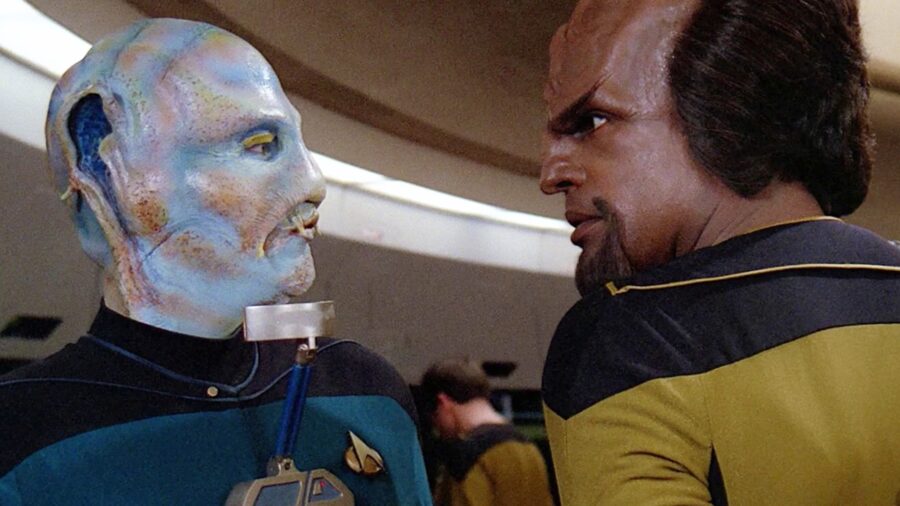Star Trek Showrunner Makes Uncomfortable Racial Comparison

The early days of Star Trek: The Next Generation were very rocky, but the season 2 episode “A Matter of Honor” was always a standout adventure. This episode has Riker serving aboard a Klingon ship and manages to mine this fish-out-of-water premise for all it’s worth. However, one thing mars this episode in a big way: then-showrunner Maurice Hurley once uncomfortably compared Riker’s story to someone being “the only white face in a meeting in Harlem.”
A Matter Of Honor

Before we can fully analyze Maurice Hurley’s uncomfortable racial comparison, it’s important to recap the episode. “A Matter of Honor” is about Riker serving aboard a Klingon vessel and learning more about these warrior’s ways even as Wesley Crusher bonds with a visiting Benzite and learns that no, not all of these vaping aliens look alike.
While the weird plot with Wesley’s buddy ultimately plays a major part in the episode’s resolution, the best part of the story is constantly seeing Starfleet golden boy Riker having trouble fitting in among the Klingons.
Maurice Hurley

At the time, Maurice Hurley was the showrunner for The Next Generation, and he was a big fan of how the franchise handled various social problems. However, he lamented how TNG couldn’t approach these issues the same way that The Original Series did, especially regarding race.
Regarding “A Matter of Honor,” he claimed that the origins of the episode came from realizing that Worf, as “the only Klingon on a basically human ship,” was experiencing the equivalent of being “the only black face in a room of forty white people.”
That idea became the springboard for “A Matter of Honor,” where Maurice Hurley said the producers wanted to “spin it.” He thought it would be interesting to explore how “funny” and “tense” it could be to put Riker on a Klingon vessel.
Now, the show could answer the crunchy question, “What is it like to be the only white face in a meeting in Harlem?”
Worf

Now, let’s address the targ in the room: what is wrong, exactly, with Maurice Hurley’s comments about race regarding Riker’s plight? To start with, he repeatedly compares the Klingons to Black people, which is pretty weird.
He wanted to capture the spirit of The Original Series, but when it came to “Let That Be Your Last Battlefield” (the episode where aliens with black and white faces persecute aliens who have their colors reversed), Star Trek bigwigs like Gene Roddenberry never diluted the social commentary by pointing out which of the mostly identical aliens were meant to be the Black ones.
Also, by looping in Worf, Maurice Hurley seems to accidentally imply that actor Michael Dorn must be constantly dealing with racism on the set.
The showrunner points out that Worf as a character is constantly feeling the perceived weirdness of being “the only black face in a room of forty white people.”
Does that mean that Dorn as an actor must have always felt weird as one of only two Black actors in an otherwise entirely white cast?
IDIC

Finally, while Maurice Hurley wanted to use this episode to explore racial tension in Star Trek, his ideas are arguably incompatible with Gene Roddenberry’s ideals (which is ironic because Hurley was once the man’s most devoted disciple).
He sees Riker as out of place in this episode and Worf as out of place basically always because they are surrounded by people who constantly remind them of their differences. But this has always been a franchise where the infinite diversity of our heroes has been a strength, not a weakness.
One Of The Better Season 1 Episodes

Despite Maurice Hurley’s rather weird perspective on “A Matter of Honor,” it is undeniably one of the best episodes of The Next Generation’s earliest years.
Riker gets plenty to do, and we learn more about Star Trek’s most popular aliens, the Klingons (although those smoked-out Benzites will always have a place in my heart).
Maybe when TNG is inevitably rebooted, we can get a Benzite-centric spiritual successor to this episode that answers a more modern question: what’s it like to be the only one vaping in a room full of 40 annoyed people?
Just, uh… asking for a friend.












